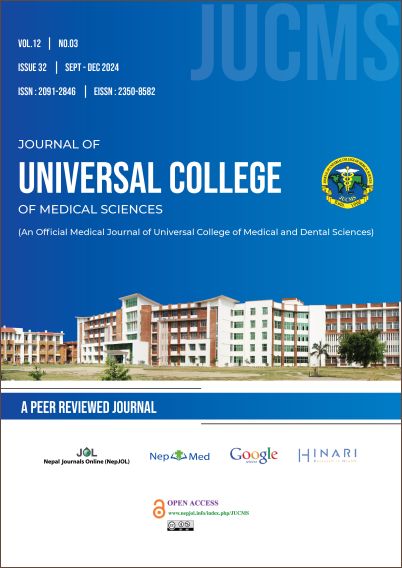Relationship between the Lifestyle and Mental Health of Medical Students of UCMS, Bhairahawa: A Cross-Sectional Study
DOI:
https://doi.org/10.3126/jucms.v12i03.73295Keywords:
Lifestyle, Mental health, PSQI, PSSAbstract
INTRODUCTION Medical students suffered from high level of stress during their studies and this percentage has been increasing. This study was conducted to find out association between lifestyle and mental health of MBBS and BDS students to encourage effective intervention to manage the stress.
MATERIAL AND METHODS A cross sectional study was conducted at Universal College of medical sciences, Bhairahawa comprising both MBBS and BDS students from first to final years by written questionnaire using stress assessing tools.
RESULTS Out of 202 students, 85.1% participants experienced stress of which 73.2% went through moderate stress while 11.9% with high stress. MBBS students were found to be more stressed than that BDS which was 59.4%. While concerning global PSQI, 57.9% complained for disturbed sleep. A significant association of stress was found with poor study ability as 89.2% experienced difficulty in coping up with study. Although more than half of students are physically active, the perceived stress score was seen still higher. A positive correlation was seen between study pattern with global PSQI (r =0.347, p= 0.001) and PSS (r =0.519, p=0.001).
CONCLUSION Sleeping pattern, physical activity, substance abuse and nutrition affect mental status. Hence, interventions should be done considering all dimensions to avoid further fatal consequences.
Downloads
Downloads
Published
How to Cite
Issue
Section
License
Copyright (c) 2024 Journal of Universal College of Medical Sciences

This work is licensed under a Creative Commons Attribution-NonCommercial 4.0 International License.
Authors have to give the following undertakings along with their article:
- I/we declare that this article is original and has not been submitted to another journal for publication.
- I/we declare that I/we surrender all the rights to the editor of the journal and if published will be the property of the journal and we will not publish it anywhere else, in full or part, without the permission of the Chief Editor.
- Institutional ethical and research committee clearance certificate from the institution where work/research was done, is required to be submitted.
- Articles in the Journal are Open Access articles published under the Creative Commons CC BY-NC License (https://creativecommons.org/licenses/by-nc/4.0/)
- This license permits use, distribution and reproduction in any medium, provided the original work is properly cited, and it is not used for commercial purposes.




